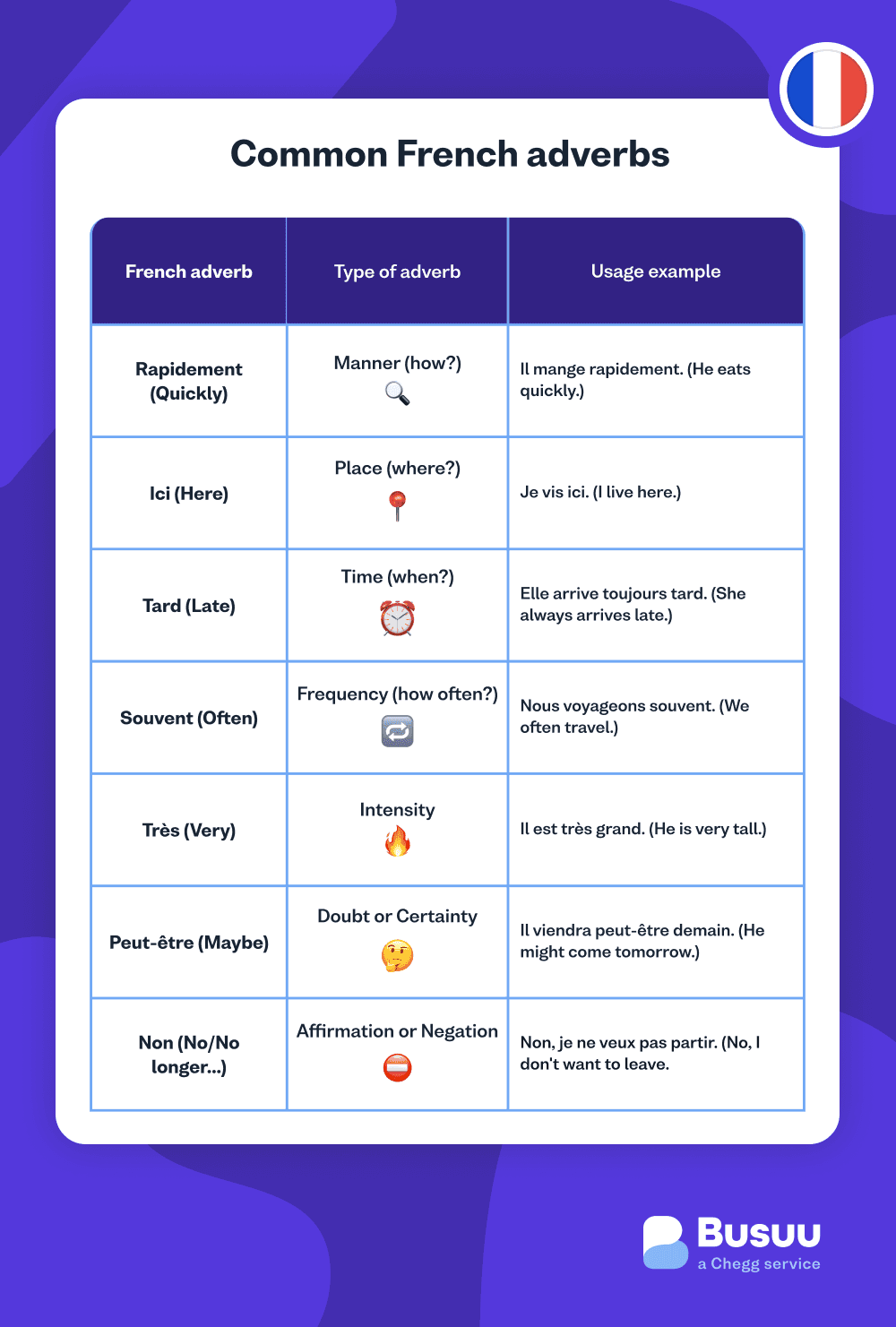I want to learn...
Adverbs are an important part of a sentence. They offer added context and further explain the when, where, to what extent and how, of the action being described. If you want to express these ideas in French, then it's time for you to learn about French adverbs.
Formation of French adverbs
Most French adverbs are formed from adjectives. The usual way to form an adverb is to take the feminine form of an adjective and add "-ment" at the end.
Here is how it works:
For masculine adjectives that end in "-e", simply add "-ment" to the adjective.
If a masculine adjective does not end in "-e", use its feminine form and add "-ment".
Some adverbs end in "-emment" or "-amment". They are formed from adjectives that end in "-ent" or "-ant".
Irregular French adverbs don't follow the common "-ment" formation rule.
For masculine adjectives that already end in "-e", you simply add "-ment" to form the adverb.
Formation of adverbs from adjectives ending with "-e"
| Masculine Adjective | Adverb |
|---|---|
| Facile (Easy) | Facilement (Easily) |
| Agréable (Pleasant) | Agréablement (Pleasantly) |
| Calme (Calm) | Calmement (Calmly) |
If the masculine adjective doesn't end in "-e", you need to use the feminine form of the adjective and then add "-ment".
Adverbs formed from feminine adjectives
| Masculine Adjective | Feminine Adjective | Adverb |
|---|---|---|
| Heureux (Happy) | Heureuse | Heureusement (Happily) |
| Lent (Slow) | Lente | Lentement (Slowly) |
| Profond (Deep) | Profonde | Profondément (Deeply) |
These adjectives form adverbs ending in "-amment" or "-emment".
Formation of adverbs by adding "-amment" or "-emment"
| Adjective | Adverb |
|---|---|
| Constant (Constant) | Constamment (Constantly) |
| Évident (Evident) | Évidemment (Evidently) |
| Suffisant (Sufficient) | Suffisamment (Sufficiently) |
Remember, there are also many irregular adverbs that don't follow these rules, so it's important to learn and memorize them as well. Irregular French adverbs that don't follow the common "-ment" formation rule.
Irregular adverbs
| Irregular Adverb | Origin | Example |
|---|---|---|
| Bien (Well) | Derived from the adjective bon (good). | Elle parle bien français. (She speaks French well.) |
| Mal (Badly) | Derived from the adjective mauvais (bad). | Il chante mal. (He sings badly.) |
| Vite (Fast) | N/A | Il court vite. (He runs fast.) |
| Tôt (Early) | N/A | Je me suis levé tôt. (I got up early.) |
| Mieux (Better) | Derived from the adjective bon (good). | Elle chante mieux que moi. (She sings better than me.) |
Function of French adverbs
French adverbs answer questions like "when", "where", "how" and to what extent is something done? Here are a few examples

Function of adverbs in a sentence
| Type of Adverb | French Adverb | Example |
|---|---|---|
| Manner (how?) | Rapidement (Quickly) | Il mange rapidement. (He eats quickly.) |
| Place (where?) | Ici (Here) | Je vis ici. (I live here.) |
| Time (when?) | Tard (Late) | Elle arrive toujours tard. (She always arrives late.) |
| Frequency (how often?) | Souvent (Often) | Nous voyageons souvent. (We often travel.) |
| Intensity | Très (Very) | Il est très grand. (He is very tall.) |
| Doubt or Certainty | Peut-être (Maybe) | Il viendra peut-être demain. (He might come tomorrow.) |
| Affirmation or Negation | Non (No/No longer...) | Non, je ne veux pas partir. (No, I don't want to leave.) |
Placement of French Adverbs
French adverbs may appear in different positions in a sentence depending on what they modify. Adverbs in French modify verbs as well as adjectives, whole phrases and other adverbs. Here is a table with some common examples:
Placement of adverbs in a sentence
| Placement | Function | French Adverb | Example |
|---|---|---|---|
| After the verb | To modify a verb | Doucement (Softly) | Il parle doucement. (He speaks softly.) |
| Before the adjective | To modify an adjective | Très (Very) | Cette femme est très courageuse. (That woman is very brave.) |
| At the beginning of the sentence | To emphasize or to modify the whole sentence | Malheureusement (Unfortunatley) | Malheureusement, je ne peux pas venir. (Unfortunately, I can’t come.) |
| At the end of the sentence | To emphasize or to modify the whole sentence | Franchement (Frankly) | Il parle franchement. (He speaks frankly.) |
| Before the adverb | To modify another adverb | Beaucoup (A lot, Much) | Il gagne beaucoup trop d’argent. (He wins a lot of money.) |
The Exception: Jamais in negative sentence
The adverb jamais (never) follows a specific rule when you use it in a negative sentence: ne + verb + jamais. For example, "Je ne mange jamais de viande." (I never eat meat.)
Expressions withtous lesandune / deux / trois fois par…
When you want to indicate frequency, use expressions like tous les (every) and une/deux/trois fois par (once/twice/thrice per). For example, "Je vais à la gym tous les jours." (I go to the gym every day.) Or, "Je mange du poisson deux fois par semaine." (I eat fish twice a week.)
The expression tous les is used for frequency, similar to "every" in English. It is used with a noun in the plural form to show that the action is done every time that something else occurs.
Adverbs of frequency – tous les
| French | English |
|---|---|
| Tous les jours | Everyday |
| Tous les soirs | Every evening |
| Tous les mois | Every month |
| Tous les ans | Every year |
Une fois par…, deux fois par…, trois fois par… indicate the number of times an action occurs in a certain period of time.
Adverbs of frequency – fois par
| French | English |
|---|---|
| Une fois par jour | Once a day |
| Deux fois par semaine | Twice a week |
| Trois fois par mois | Thrice (Three times) per month |
| Une fois par an | Once a year |
Wrapping up
Mastering French adverbs allows you to express yourself more precisely and fluently in French.
Take the time to familiarize yourself with them and practice using them in sentences. Their formation often follows a standard rule of adding "-ment" to the feminine form of adjectives. However, there are some exceptions to bear in mind.
French adverbs answer questions like how, when, where, and to what extent. They offer you the ability to express time, intensity, place, quantity, and frequency.
The placement of adverbs varies depending on the context and what part of the sentence they modify. When modifying an adjective, adverbs in French are usually placed before the adjective. They are usually placed at the beginning or at the very end of a sentence when modifying a whole sentence. French adverbs are placed after the verb when modifying a verb.
Remember, getting a firm grasp on French adverbs is a big step forward in achieving your French language goals. Keep practicing and keep learning!
Newlanguages


